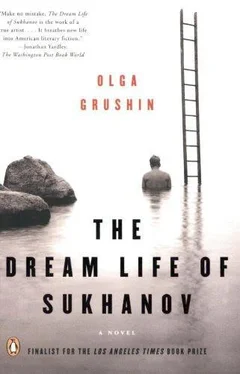On a brightly illuminated square, before gingerbread houses with red roofs and golden shutters, Swanilda and her friends threw their legs up in the air in a flurry of lace and enthusiasm. Sukhanov felt distracted. He was sitting so close he could hear the tentative creaks of the floorboards and the soft slaps of the dancers’ feet, could see that a braided wig on one of the women had slipped to the side, could almost guess at the multicogged machinery concealed in the wings, at any moment ready to set the silver foil of the moon gliding across a painted sky or wafts of smoke puffing cozily from two-dimensional chimneys. His box, draped in crimson velvet, sealed with an embroidered coat of arms, and almost hanging over the stage, was a clear mark of privilege, and yet, ironically, this very proximity revealed the dance to be replete with sweaty effort, robbing it of the magical illusion necessary for his enjoyment—so much so that he found himself envying the nobodies in the top gallery for whom the ballet must have seemed one blurry, whirling extravaganza of music, color, and light.
During the second intermission, Vasily roamed the sparkling cavity of the theater with his binoculars, announced that he saw an acquaintance, and slipped out. Sukhanov was left alone with his mother. He had meant for this to be a full family outing, but Nina still complained of a headache, and Ksenya had declared a particular dislike for Coppelia. “This is a perfect illustration of the difference between the French and the Germans,” she had said. “Delibes takes Hoffmann’s sinister tale of love and insanity and turns it into a story of a village Don Juan who is courting two women at once. Read it, and you’ll see what I mean.” She had then tossed a weighty volume onto his desk, upsetting his papers and causing a sheet of his biography to flutter to the floor; but before he had had time to scold her, Vasily had asked whether he could borrow his cuff links, Valya had come knocking on the door with an invitation to tea, the chauffeur had called from downstairs to report that the car was ready—and now here he was, confined in the mothball-permeated, cherry-colored plushness of the box with his mother, making polite little noises of attention in her direction.
“I think the costumes and the sets are lovely,” she replied in answer to his question, glancing at him in her quick, habitually frightened manner. “Only I can’t quite figure out… If Coppelia is the boy’s fiancée, then who is this other girl?”
“No, Mother, it’s Swanilda who is the fiancée,” he said, swallowing a sigh. “Swanilda is the village girl, and Coppelia…” Ruffling the program, he read the mildly ridiculous synopsis to her once again. “‘And in the end,’ “he finished patiently, ”‘the village celebrates its new church bell, and Franz and Dr. Coppelius each get a bag of gold.’”
Nadezhda Sergeevna nervously readjusted her ill-fitting purple dress.
“But I thought Dr. Coppelius was a negative character,” she said with another frightened look at her son.
Before he could answer, the lights began to dim, the yellow tassels on the curtain quivered and started to slide, a burst of music erupted, and Vasily tiptoed back to his seat, stepping on his neighbors’ feet and murmuring apologies. Sukhanov resigned himself to another stretch of melodious boredom. A little girl directly behind him, the daughter of someone in the Bolshoi’s top administration, was unwrapping a lollipop, noisily, endlessly, infuriatingly, and her mother kept imploring her to stop, in a loud, tragic whisper; there were always too many children at matinees. Mercifully, the performance ended quickly.
As the three of them emerged from the shadowy forest of the Bolshoi’s columned lobby, his mother leaning heavily on his arm, the slanting afternoon sun that set fire to pools of yesterday’s rainwater disoriented Sukhanov for a moment. They had not yet descended the steps when Vasily said he had to meet some friends. It seemed to Sukhanov that his son’s eyes were cold and his parting abrupt; but of course, his perceptions might have been colored by the previous night’s realization that, through an accidental blunder on his part, he had deprived the boy of a potentially brilliant twist of fate. He had tried to forget that unlucky brush with august favor, but a faintly nauseating feeling, strangely akin to a feeling of guilt, kept stirring inside him, and it was almost with relief that he watched Vasily run down the staircase and vanish in the crowd of theatergoers. Most likely, it was the same feeling of guilt that prompted him, in the very next breath, to accept his mother’s offer of tea—for it had been her invitation to Malinin’s opening that he had given to Ksenya, thinking Nadezhda Sergeevna a bit unpresentable for an event of such importance.
In truth, Sukhanov rarely enjoyed his mother’s company. Apart from her grim button-down dresses, her long gray hair pulled back in a fastidious bun, her eternal air of watchful uncertainty accompanied by fluttering gestures and startled looks, and the cloyingly sweet smell of Krasnyi Oktyabr, a perfume she had used all her life—in short, apart from the things one gleaned within the first half-hour of being in her presence—there seemed to be nothing material about her. She used to work in one of those ubiquitous patriotic organizations with a conspiratorial acronym for a name that had mushroomed in the first days of the Revolution, but which had, unlike most others, survived the tossings of history and continued to exist in some forgotten corner of Moscow. She had spent thirty years there as an accountant, although she had no formal education and no particular acuity for numbers. Sukhanov had always found it difficult to imagine her bent for hours over some massive desk in a poorly lit office with a rain-stained view of a littered courtyard and a few dying plants on the windowsills, writing down columns of meaningless arithmetic; but at least her job, vapid as it had been, had offered her a peg on which to hang her days, her weeks, her years. Ever since her retirement two decades earlier, her life had lost what little shape it had. He had never seen her with a book, walking made her tired, and the arts left her indifferent; he had no doubt it was only her misplaced sense of duty that made her timorously, with neither enjoyment nor understanding, accompany him every few months on some cultural outing. She had no acquaintances that he knew of, and no living relatives except himself. Her two-room apartment, in an old Arbat building with no elevator, invariably made him feel that her private clock had stopped many years before, as if the very notions of past and future had long since lost their relevance here. Everything was spotless, precisely placed, and absolutely unchanged from his previous visit, all his previous visits—from the time, in fact, when she had first moved here, in 1964. Purple bouquets of artificial flowers bristled pompously in black vases on her bureaus, whose surfaces were covered with yellowing doilies; a small reproduction of Shishkin’s Pine Forest decorated the wall above her drab green couch with its primly arranged profusion of lacy pillows; the same aluminum-encased clock that showed a red-lettered date in the narrow slot in its base stood on top of the old-fashioned television set that she stubbornly refused to relinquish in favor of a newer model. Even the air in the apartment did not play or move but simply hung, and Sukhanov involuntarily began to breathe deeper and talk louder the moment he walked inside, as if trying to drown out a persistent feeling of sadness.
“Just one more, Tolya, eat one more,” she pleaded, pushing at him a plate piled with sugarcoated confections he abhorred. “Are you sure? Well, at least take a few home to the kids, I have plenty. Here, why don’t I wrap them up for you, come to the kitchen.”
Читать дальше








![Theresa Cheung - The Dream Dictionary from A to Z [Revised edition] - The Ultimate A–Z to Interpret the Secrets of Your Dreams](/books/692092/theresa-cheung-the-dream-dictionary-from-a-to-z-r-thumb.webp)



